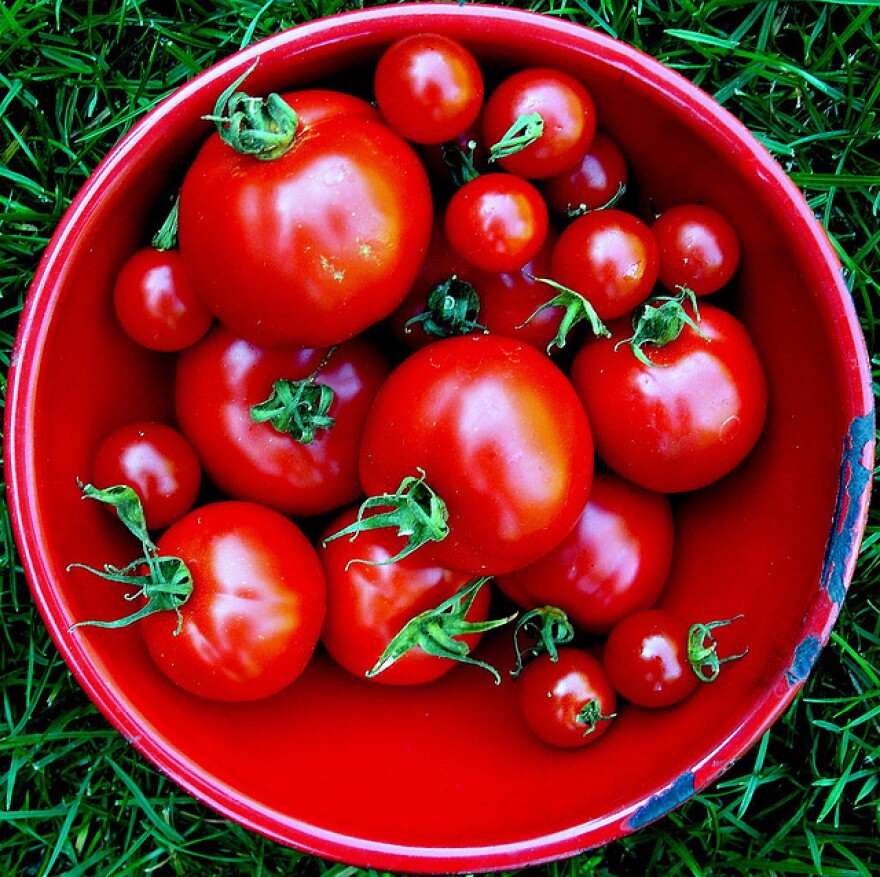Cornish resident and 'Gardening Guy’ Henry Homeyer has been busy harvesting his tomatoes. He offers some tips on what to do with a bumper crop.
How have your tomato plants been doing this year?
“It’s been a great year – knock on wood – for tomatoes. We’ve had plenty of sunshine, plenty of moisture. I get a lot of emails from readers of my weekly gardening column and I have not heard a single complaint about late blight coming in early and wiping out anybody’s tomatoes, so I think we’re doing fine.”
That’s good news, because I know in recent years, we’ve had some blight.
“We have.”
So what do you do with all those tomatoes, Henry?
“I process them for the winter, the spring, and the fall. I freeze, I dehydrate, I roast, I make tomato paste. I do lots of stuff.”
How do you make tomato paste?
“Tomato paste is easy. I take tomatoes, and I often use ones that are less than perfect and I cut out any bad spots. I core them over the sink and squeeze out a lot of the excess moisture seeds, throw them into the Cuisinart food processor, and puree them. I put them in a big enamel-covered pot, heavy pot and cook them two or three hours until I’m literally able to stand up a spoon in the paste. I leave it overnight with the lid off, and in the morning I spoon paste into ice cube trays, I freeze them and they’re frozen I put the cubes into Ziploc bags and put them back into the freezer. Then when I’m ready to use them, I have discreet, small quantities, so that I don’t end up with excess tomato paste the way you do when you open a big can of tomato paste and only take one spoon out of it.”
Sure, and you can use this throughout the winter.
“Exactly.”
Now you said freeze tomatoes. I’ve never thought to freeze fresh garden tomato. How do you do that?
“I take whole, clean tomatoes, put them in a gallon Ziploc bag, usually nine to the bag, put them on a cookie sheet, and put them in the freezer. And that makes a nice, hard red rock, which I can then use in the winter in soups and stews. I take it out of the freezer, I run it under hot water because I like to remove the skins. Just rub a little bit, the skin comes off. Then you can just chop it and put into the stir fry or in a soup. You know where it’s coming from. You know there are no pesticides on it if you’ve grown it yourself. And they taste so good, it’s from the garden.”
What about dehydrating tomatoes?
“It’s a fabulous way to store tomatoes, particularly if you don’t have a lot of freezer space. Over the years, I’ve tried just about every kind of dehydrator available. I’m using cherry tomatoes. I grow maybe ten cherry tomatoes each year and each plant produces a huge number of these little gems. I cut them in half, put them on a tray in the dehydrator, and when they’re chewy and dry but not brittle, they’re ready to go in a Ziploc bag.”
Do you use those for cooking throughout the winter as well?
“I do. They’re little nuggets of summertime that I find in my soups and stews. It’s fun when you’re serving something to a guest and they bite into one of these and their face just lights up because it is such an intense flavor. If you bought dehydrated tomatoes at the store, they’re extremely expensive, but you can do it at home with almost no work. It’s cutting them in half, and running the dryer.”
There’s nothing quite like a fresh-picked tomato in summer. How does that taste standup in January?
“It’s different, but I still think it’s worth the extra effort.”
Read more from Henry here.









